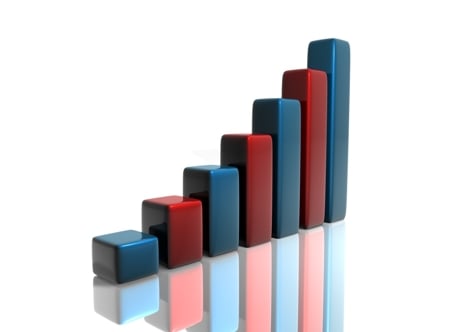Firm has cut funds' average bond maturities from 19 years to nine
Bond market investors are showing the greatest confidence in global economic growth since credit markets crashed three years ago.
Yields on debt securities are rising for a fourth month as prices fall, the longest stretch since June 2008, according to Bank of America Merrill Lynch's Global Broad Market Index, which tracks the performance of more than 19,000 securities valued at about $39 trillion. While the highest-rated debt, from U.S. Treasuries toMicrosoft Corp. debentures, are falling, the riskiest company notes are returning the most in eight years.
“We've just experienced the first several months of a bear market in bonds,” said Michael Hyman, head of investment-grade credit in Atlanta at ING Investment Management, which oversees about $518 billion.
While bonds rallied last week as turmoil in the Middle East and North Africa spread, debt prices have fallen 3.54 percent since August as the MSCI World Index of stocks surged 24 percent. Consumer confidence in the U.S. climbed during the week ended Feb. 20 to the highest level since April 2008.
Manufacturing is expanding worldwide. The Institute for Supply Management's factory index for the U.S. rose to 60.8 in January, the highest level since May 2004. China said last month that industrial production rose 13.5 percent in 2010, while growth in Europe's service and manufacturing industriesaccelerated to the fastest pace in more than four years this month, led by stronger output in Germany.
Rising Rates
Market interest rates are the highest in more than a year, rising to 3 percent from last year's low of 2.14 percent on Aug. 31, the Broad Market Index shows. Sovereign debt, considered the least at risk of default, has performed the worst, losing 2.99 percent after reinvested interest since August. U.S. Treasuries are down 2.88 percent.
In coming years, the record amount borrowed by the U.S. Treasury may cause yields to rise, said Dan Fuss, who helps oversee $152 billion of assets as vice chairman of Boston-based Loomis Sayles & Co. U.S. debt rose to $14.03 trillion as of Dec. 31 from $5.77 trillion a decade ago, according to data compiled by Bloomberg.
“We're in for 20 years of rising interest rates,” Fuss said in an interview. Yields will climb amid “larger and larger claims on savings by the U.S. Treasury,” he said.
Loomis has cut its funds' average maturities to about nine years from 19 during in anticipation of rising rates, he said.The U.S. will have cumulative deficits of more than $4 trillion through the end of 2015, the Obama administration forecast this month. Interest expense will rise to 3.1 percent of gross domestic product by 2016 from 1.3 percent last year, according to administration estimates.
Junk bonds' extra yield relative to Treasuries offers a cushion, said Charles Lieberman, the former head of monetary analysis at the Federal Reserve Bank of New York who now serves as the chief investment officer at Advisors Capital Management LLC in Hasbrouck Heights, New Jersey.
Advisors Capital hasn't owned Treasuries for about a year and prefers high-yield bonds, convertible securities and floating-rate debt, said Lieberman. “Our fixed-income strategy is based on the proposition that rates are rising.”
Junk bonds certainly are. High-yield debt, rated below Baa3 by Moody's Investors Service and less than BBB- by Standard & Poor's, have returned 3.48 percent this year, the best start since gaining 3.89 percent at the same point in 2003, Bank of America Merrill Lynch indexes show. U.S. junk yield fell to a record low 7.29 percent on Feb. 22.
‘Favorable Outlook'
Investors see less risk of defaults because the global economy is forecast to expand 4.22 percent this year and 4.54 percent in 2012, according to International Monetary Fund data, after shrinking 0.58 percent in 2009.
“It's a favorable outlook for the global economy,” said John Lonski, the chief economist at Moody's Capital Markets Group in New York. Anything better than about 3 percent is healthy, he said.
Bond returns globally have fallen to a 0.14 percent loss this year, including a 0.22 percent decline for Treasuries and a drop of 0.49 percent for sovereign debt, according to Bank of America Merrill Lynch index data.
Losses were tempered this month as spreading political tension in the Middle East led investors to seek the safety of government debt. Before last week, bonds were headed for a sixth straight monthly loss, the longest stretch since the Global Broad Market Index was created in 1997. Now, they're up 0.13 percent for February.
Economic Growth
Protests in Egypt, Bahrain, Libya and Tunisia drove oil above $100 a barrel in New York for the first time since October 2008, raising concern that rising commodity prices would curb consumer spending and add to inflation at a time when unemployment in the U.S. is 9 percent.
JPMorgan Chase & Co. cut its first-quarter U.S. economic growth estimate to an annual rate of 3.5 percent from 4 percent, according to chief U.S. economistMichael Feroli.
“Consumers stumbled a bit to start the year,” Feroli wrote in a note e-mailed to clients on Feb. 25. “The recent rise in energy prices poses a notable headwind.”
The U.S. government said on Feb. 25 that gross domestic product grew at a 2.8 percent annual rate in the fourth quarter, less than the 3.2 percent it originally estimated, as state and local governments made deeper cuts in spending.
That revision, among other things, has some money managers doubting that The Federal Reserve will raise rates. The Fed “is on hold, unemployment is high and inflation is low,” said Matthew Marra, a money manager at New York-based BlackRock Inc., the world's largest asset manager, with about $3.45 trillion. “The things you would expect to cause dramatically higher interest rates are not in place today.”







